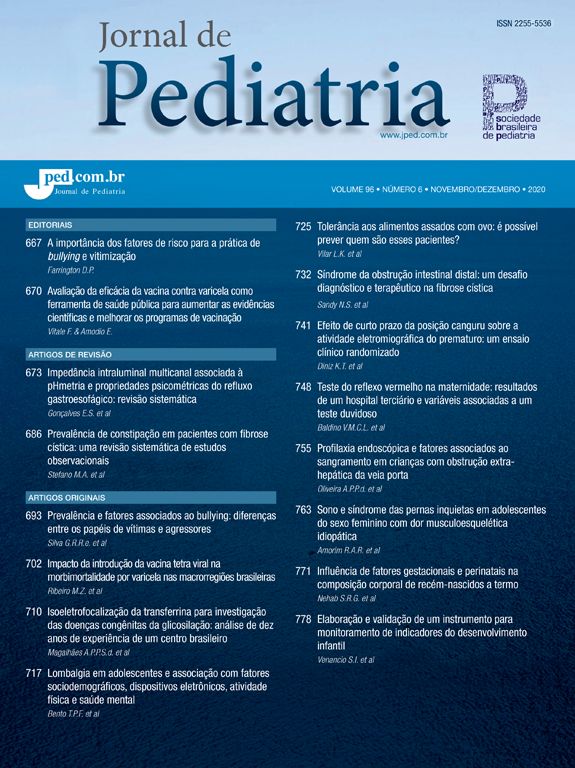To measure the prevalence of children with adequate weight who feel fat and to examine the factors associated with this perception.
MethodsCross-sectional study with 901 schoolchildren aged 8-11 years selected by cluster sampling. The children had their weight and height measured, and answered a questionnaire that included a self-esteem scale and questions on self-perception of weight, and perception of parents' and friends' expectations regarding the child's weight.
ResultsThe prevalence of children with BMI percentile < 85 who considered themselves fat was 13%, and the variables significantly associated with this perception were: female gender (OR = 2.45; 95%CI 1.42-4.24), 11 years of age (OR = 2.35; 95%CI 1.13-4.89), lowest quartile of self-esteem (OR = 2.08; 95%CI 1.17-3.68), the perception that parents expect them to be thinner (OR = 3.00; 95%IC 1.52-5.91), and body mass index percentile (OR = 1.04; 95%CI 1.03-1.06).
ConclusionsThe perception of being fat when having adequate weight afflicts children before preadolescence, particularly girls aged 11 years, with higher body mass index, lower self-esteem, and who think their parents expect them to be thinner. Future studies should examine in depth the causes and consequences of this attitude.
Investigar a prevalência de crianças com peso adequado que se sentem gordas e os fatores associados a essa percepção.
MetodologiaEstudo transversal com 901 escolares, entre 8 e 11 anos, selecionados por conglomerados. As crianças tiveram peso e altura aferidos e responderam um questionário com escala de auto-estima, autopercepção do peso e percepção da expectativa dos pais e amigos em relação a seu peso.
ResultadosA prevalência de escolares com percentil do índice de massa corporal (IMC) < 85 que se sentem gordos foi 13%, e as variáveis significativamente associadas a essa percepção foram sexo feminino (RC = 2,45; IC95% 1,42-4,24), ter 11 anos de idade (RC = 2,35; IC95% 1,13-4,89), quartil inferior de auto-estima (RC = 2,08; IC95% 1,17-3,68), percepção de que os pais gostariam que eles fossem mais magros (RC = 3,00; IC95% 1,52-5,91) e percentil do IMC (RC = 1,04; IC95% 1,03-1,06).
ConclusãoA percepção de ser gordo, mesmo com peso adequado, atinge crianças antes da adolescência, em especial meninas de 11 anos de idade, com maior IMC, menor auto-estima e que pensam que seus pais gostariam que fossem mais magras. São necessários mais estudos que aprofundem as causas e conseqüências desse comportamento.








